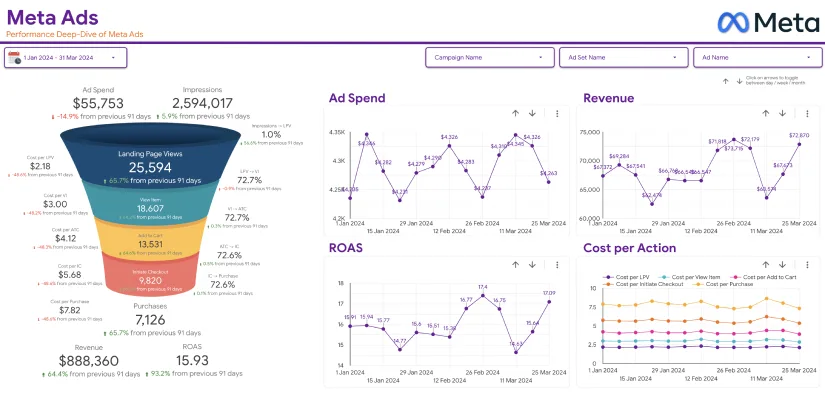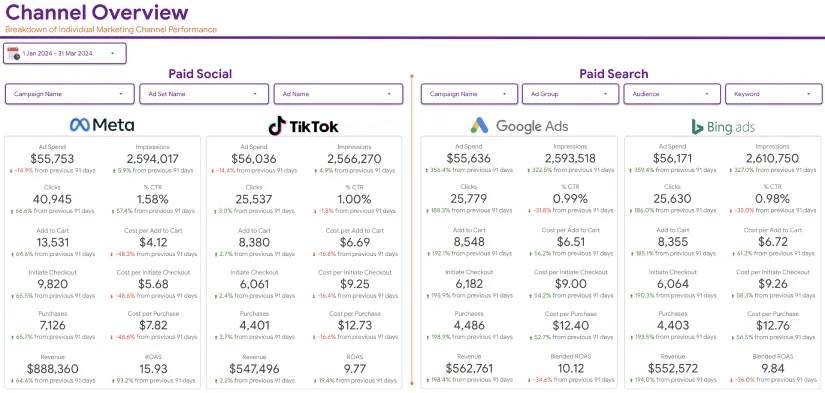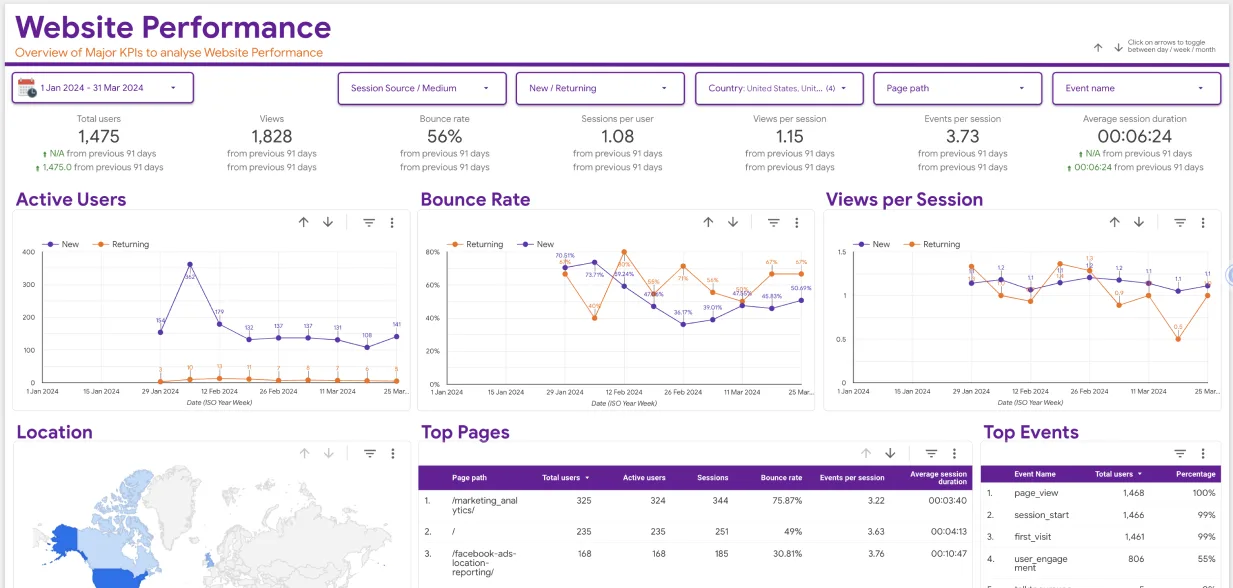Want to know how to create automated SEO reports for your clients? This post includes all the information you’ll need.
While the digital landscape is known for its fast pace and constant evolution, one critical aspect that is known to be the most volatile is SEO (Search Engine Optimization). With Google working on SGE (Search Generative Experience) to regular algorithm updates that can significantly impact rankings overnight, staying on top of your automate SEO reporting strategy is an absolute must.
For agencies and freelancers offering SEO services, providing comprehensive reports to clients regularly is essential. The reports showcase progress and also offer clients excellent insights into the value you are providing. However, creating these SEO reports manually can be time-consuming. That’s where automated SEO reports come into the picture, aligning with evolving business intelligence trends to streamline reporting and enhance efficiency.
In this article, we’ll take a look at what these SEO reports are, how to generate them automatically, and more to ensure you can spend more time delivering results.
What are SEO Client Reports?
You might be wondering ‘what are automated SEO reports’? An SEO client report is a comprehensive document that provides a detailed analysis of a website’s SEO performance. The report generally includes metrics such as keyword rankings, organic traffic, backlink profiles, and technical SEO audits.
It works as a critical communication tool between the client and the SEO agency, highlighting the value of SEO efforts, progress tracking, identifying opportunities for improvement, and building trust.
Why Do Clients Ask for SEO Reports?
When someone is paying for a service, they want to know the value your services are bringing to their business. The same applies to a client SEO report as well. Here are some common reasons why SEO reports are important for clients-
Performance Tracking
Clients want to know how their website is performing over time. Custom SEO reports help them track progress, identify trends, and understand which strategies are working.
Return on Investment (ROI)

SEO can be a significant investment, and clients want to see a clear return on that investment. An SEO client report highlights key metrics that show whether the investment is paying off.
Accountability
SEO reports for customers and clients provide accountability by showing what work has been done and what results have been achieved. This transparency helps maintain trust between the client and the service provider.
Strategic Decision-Making
Custom SEO reports offer insights that can inform broader business decisions. For instance, if certain keywords or content topics are performing well, clients can adjust their marketing strategies accordingly.
Communication
Regular SEO reports for clients ensure ongoing communication between the service provider and the client. This communication is vital for addressing concerns, celebrating successes, and planning future actions.
How to Create Automated SEO Reports for Your Clients? Follow These Steps
Creating automated SEO reports for clients involves setting up a system that regularly pulls data from various sources and compiles it into a report format that is easy for clients to understand. Here’s a step-by-step guide on how to create automated SEO reports for your clients:
1. Define Key Metrics and KPIs
Before setting up your automated reports, it’s essential to define the key metrics and KPIs (Key Performance Indicators) that matter most to your clients. These might include:
- Keyword Rankings- Tracking the rankings of targeted keywords over time.
- Organic Traffic- Tracking visitors organically visiting your website through search results.
- Backlink Profile- Analyzing the quality and quantity of backlinks linking to the client’s website.
- Conversions- Tracking how many visitors are converting into leads or customers.
- Bounce Rate- Tracking how many visitors leave the website after viewing a single page.
- Page Load Speed- Measuring the time it takes for pages to load, which can impact both user experience and rankings.
Understanding what your client values will help you customize the report to their needs.
2. Choose the Right Tools

The next step in automating SEO reports for clients is selecting the right SEO reporting tools. Several tools can help automate the process, each with its unique features. Some popular options include:
- Google Analytics and Search Console- Google Analytics is one of the best free ways to accurately track website traffic and user behavior. Google Search Console, on the other hand, allows you to track website performance and offers technical SEO insights.
- SEMrush- A comprehensive SEO tool that offers automated report generation with data on keyword rankings, backlinks, and site audits.
- Ahrefs- Another powerful SEO tool that provides automated reporting features, focusing on backlinks, content analysis, and competitor research.
- Moz- Known for its user-friendly interface, Moz offers automated reports that include key metrics like domain authority, keyword rankings, and on-page SEO performance.
- Google Looker Studio- A free tool by Google that allows you to create customizable reports by pulling data from various sources like Google Analytics, Google Search Console, and more. It makes the whole process of creating automated SEO reports hassle-free and quick.
3. Set Up Data Sources
An automated SEO report for clients requires access to data sources like Google Analytics, Google Search Console, and your chosen SEO tools. Ensure these sources are correctly linked to your reporting tool so the data is automatically pulled in.
For example, in Google Looker Studio, you can connect to Google Analytics to track organic traffic, to Google Search Console for keyword rankings, and to other tools like SEMrush or Ahrefs for additional data.
4. Design the Report Template
The next step is to design a report template that is both informative and visually appealing. Your template should include sections for each of the key metrics you’ve defined, with charts, graphs, and tables that make the data easy to interpret.
In tools like Google Data Studio, you can use pre-built templates or create a custom one from scratch. Make sure to include the client’s branding, such as their logo and color scheme, to personalize the report.
5. Automate the Reporting Schedule

One of the main advantages of automate SEO reporting is that you can set them to be generated and sent out on a regular schedule. Depending on the client’s needs, this might be weekly, monthly, or quarterly.
In most reporting tools, you can set up scheduled email delivery, ensuring that the report is automatically sent to the client at the specified intervals, saving time and ensuring consistency.
6. Customize the Report for Each Client
While SEO automation is about efficiency, it’s still important to customize each report to address the specific goals and preferences of the client. This might include adding custom commentary, highlighting specific achievements, or addressing areas that need improvement.
Some tools allow you to add text boxes and annotations directly within the report, making it easy to include personalized notes for each client.
7. Review and Test the Reports
Before finalizing your automated reporting process, review the reports to ensure all data is accurate and correctly displayed. It’s also a good idea to test the SEO automation by sending a few reports to yourself before they go out to clients.
This step ensures that there are no errors and that the reports meet the client’s expectations.
Examples of SEO Reports for Clients
To better understand what an SEO report should look like, here are some examples of SEO reports for clients-
1. Monthly SEO Performance Report
This type of report provides a comprehensive overview of the SEO performance over the past month. It includes sections on keyword rankings, organic traffic trends, top-performing pages, and backlink profiles. The report also highlights any significant changes or achievements, such as improvements in keyword positions or an increase in organic traffic.
2. Keyword Ranking Report
A keyword ranking report focuses specifically on the performance of targeted keywords. It tracks the rankings of these keywords over time, showing whether they have moved up or down in the search engine results pages (SERPs). This report is useful for clients who are particularly interested in their visibility for specific search terms.
3. Technical SEO Audit Report

A technical SEO audit report analyzes the health of a website from a technical perspective. It covers areas like page speed, mobile-friendliness, crawl errors, and broken links. This report is particularly valuable for clients looking to improve the overall user experience and site performance.
4. Backlink Analysis Report
This report focuses on the client’s backlink profile, analyzing the quantity and quality of backlinks pointing to their site. It also identifies any low-quality links that could harm the site’s SEO. A backlink analysis report is crucial for clients who are concerned about their site’s authority and link-building strategy.
Ready to Create Your First Automated Client SEO Report?
Knowing how to create automated SEO reports for your clients is a strategic move that saves time, enhances accuracy, and provides consistent communication. By using the right tools, defining key metrics, and customizing reports to fit each client’s needs, you can deliver valuable insights that help your clients understand the impact of your SEO efforts.
Automate SEO reporting not only demonstrate the value of your services but also empower clients to make informed decisions based on data-driven insights. As you continue to refine your reporting process, you’ll find that these reports become an integral part of your client relationships, contributing to long-term success.






